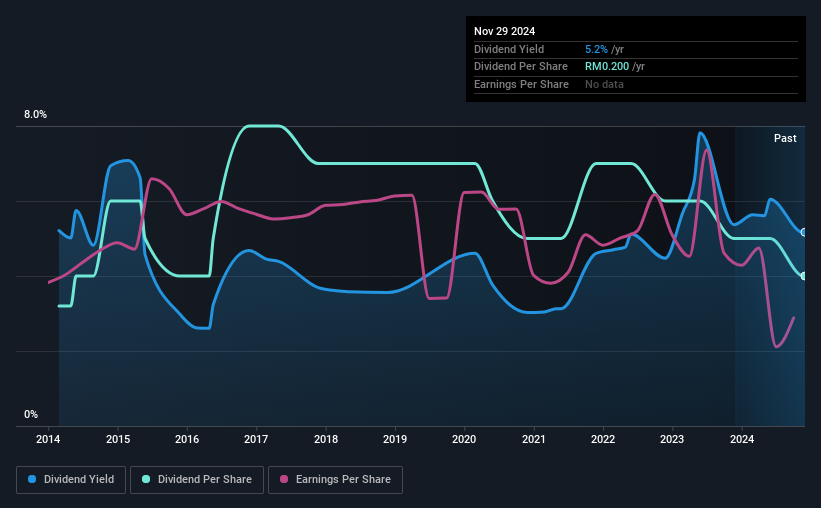- Malaysia
- /
- Industrials
- /
- KLSE:HAPSENG
Don't Race Out To Buy Hap Seng Consolidated Berhad (KLSE:HAPSENG) Just Because It's Going Ex-Dividend

Readers hoping to buy Hap Seng Consolidated Berhad (KLSE:HAPSENG) for its dividend will need to make their move shortly, as the stock is about to trade ex-dividend. The ex-dividend date is one business day before a company's record date, which is the date on which the company determines which shareholders are entitled to receive a dividend. The ex-dividend date is important because any transaction on a stock needs to have been settled before the record date in order to be eligible for a dividend. This means that investors who purchase Hap Seng Consolidated Berhad's shares on or after the 4th of December will not receive the dividend, which will be paid on the 19th of December.
The company's next dividend payment will be RM00.10 per share, on the back of last year when the company paid a total of RM0.20 to shareholders. Looking at the last 12 months of distributions, Hap Seng Consolidated Berhad has a trailing yield of approximately 5.2% on its current stock price of RM03.87. We love seeing companies pay a dividend, but it's also important to be sure that laying the golden eggs isn't going to kill our golden goose! So we need to check whether the dividend payments are covered, and if earnings are growing.
Check out our latest analysis for Hap Seng Consolidated Berhad
Dividends are typically paid out of company income, so if a company pays out more than it earned, its dividend is usually at a higher risk of being cut. Last year Hap Seng Consolidated Berhad paid out 93% of its profits as dividends to shareholders, suggesting the dividend is not well covered by earnings. That said, even highly profitable companies sometimes might not generate enough cash to pay the dividend, which is why we should always check if the dividend is covered by cash flow. Over the last year, it paid out more than three-quarters (86%) of its free cash flow generated, which is fairly high and may be starting to limit reinvestment in the business.
It's good to see that while Hap Seng Consolidated Berhad's dividends were not well covered by profits, at least they are affordable from a cash perspective. Still, if this were to happen repeatedly, we'd be concerned about whether the dividend is sustainable in a downturn.
Click here to see how much of its profit Hap Seng Consolidated Berhad paid out over the last 12 months.

Have Earnings And Dividends Been Growing?
Companies with falling earnings are riskier for dividend shareholders. If earnings fall far enough, the company could be forced to cut its dividend. Readers will understand then, why we're concerned to see Hap Seng Consolidated Berhad's earnings per share have dropped 14% a year over the past five years. Such a sharp decline casts doubt on the future sustainability of the dividend.
Another key way to measure a company's dividend prospects is by measuring its historical rate of dividend growth. Hap Seng Consolidated Berhad has delivered an average of 2.3% per year annual increase in its dividend, based on the past 10 years of dividend payments. The only way to pay higher dividends when earnings are shrinking is either to pay out a larger percentage of profits, spend cash from the balance sheet, or borrow the money. Hap Seng Consolidated Berhad is already paying out a high percentage of its income, so without earnings growth, we're doubtful of whether this dividend will grow much in the future.
The Bottom Line
Has Hap Seng Consolidated Berhad got what it takes to maintain its dividend payments? Earnings per share have been shrinking in recent times. Worse, Hap Seng Consolidated Berhad's paying out a majority of its earnings and more than half its free cash flow. Positive cash flows are good news but it's not a good combination. Bottom line: Hap Seng Consolidated Berhad has some unfortunate characteristics that we think could lead to sub-optimal outcomes for dividend investors.
With that being said, if you're still considering Hap Seng Consolidated Berhad as an investment, you'll find it beneficial to know what risks this stock is facing. For instance, we've identified 2 warning signs for Hap Seng Consolidated Berhad (1 can't be ignored) you should be aware of.
If you're in the market for strong dividend payers, we recommend checking our selection of top dividend stocks.
Valuation is complex, but we're here to simplify it.
Discover if Hap Seng Consolidated Berhad might be undervalued or overvalued with our detailed analysis, featuring fair value estimates, potential risks, dividends, insider trades, and its financial condition.
Access Free AnalysisHave feedback on this article? Concerned about the content? Get in touch with us directly. Alternatively, email editorial-team (at) simplywallst.com.
This article by Simply Wall St is general in nature. We provide commentary based on historical data and analyst forecasts only using an unbiased methodology and our articles are not intended to be financial advice. It does not constitute a recommendation to buy or sell any stock, and does not take account of your objectives, or your financial situation. We aim to bring you long-term focused analysis driven by fundamental data. Note that our analysis may not factor in the latest price-sensitive company announcements or qualitative material. Simply Wall St has no position in any stocks mentioned.
About KLSE:HAPSENG
Hap Seng Consolidated Berhad
An investment holding company, engages in the plantation, property investment and development, credit financing, automotive, trading, and building materials businesses in Malaysia and internationally.
Excellent balance sheet second-rate dividend payer.
Similar Companies
Market Insights
Community Narratives



